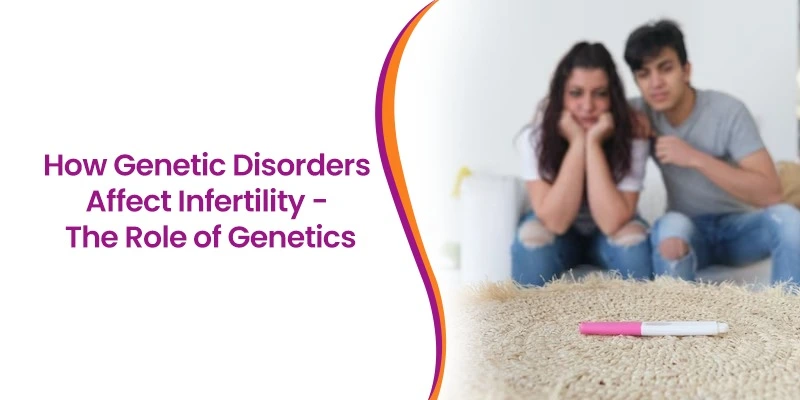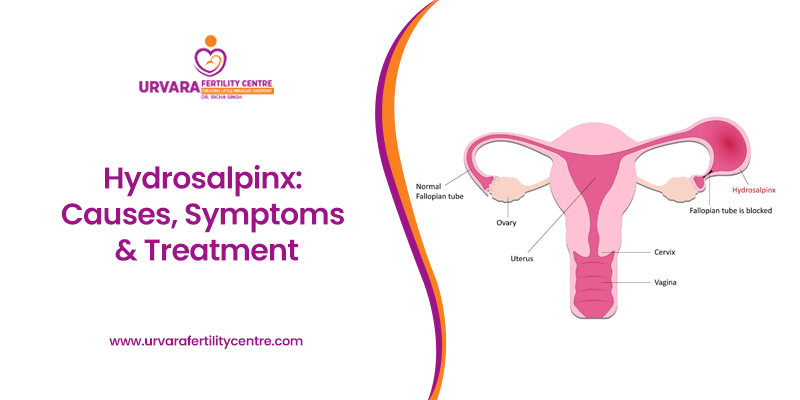In the journey of parenthood, genetics plays a crucial role and pregnancy can be affected due to genetic disorders. It is essential to know about genetic issues because it can make the journey to conceive a baby a bit more challenging and hectic.
Our genes contain a set of instructions that decide how we grow and develop and sometimes, this set of instructions can have mistakes or changes. These changes or mistakes may lead to genetic disorders. Some genetic abnormalities that can affect an embryo such as defects in chromosomal makeup which result in Down syndrome, cystic fibrosis, Trisomy 18, Trisomy 13, and others.
Are Genetic Disorders Related To Infertility?
Genes are the most important element of DNA because they determine a human’s function, personal features, and development like hair color or eye color. Genetic disorders may be caused by problems with either genes or chromosomes. It can affect your fertility ability in many ways. It can cause infertility in males or females by affecting their reproductive system and can cause failure during implantation, miscarriage, and chromosomal abnormality in the embryo.
If a child is born with a single gene disorder, then the child may face any birth defect due to chromosomal abnormality. The best infertility specialist in Lucknow can help in evaluating chromosomal abnormality in embryos by preimplantation genetic testing (PGT) through the IVF process.
Other than single gene disorders, genomic imprinting may arise from abnormal chemical modification in the parts of DNA that make specific genes. This change can cause miscarriage or disease in your baby.
Genetic Disorders That Can Cause Male or Female Infertility
In males, genetic disorders can cause sperm abnormalities which result in infertility. These include cystic fibrosis, gene mutation, Noonan syndrome, Kleinfelter syndrome, Y chromosome deletion, etc.
Genetic disorders in males can cause azoospermia which means no production of sperm, asthenozoospermia that means poor sperm motility, and teratozoospermia which means very poor-quality sperm or absence of vas deferens. With the help of semen analysis fertility specialists may diagnose the problem and guide solutions accordingly.
Genetic Abnormalities Can Cause Such Issues in Females
Genetic abnormalities in women can cause ovulation disruption or infertility. These include Fragile X syndrome, Kallmann syndrome, and others. Gene disorders can also result in malformations of the reproductive system in females.
Which Chromosomal Abnormalities Cause Infertility?
Each embryonic cell contains 46 chromosomes which means 23 from the mother and 23 from the father. Chromosomal abnormalities are transferred from parents to their babies. There are two types of abnormalities, and these are numeric and structural abnormalities.
Aneuploidy – means a person has one less or maybe one more chromosome in a normal pair. In such a condition monosomy or trisomy take place in that person due to abnormal division and an extra copy of chromosome 21 can result in Down syndrome.
Genomic imprinting – it means a change in chemical modification in DNA which doesn’t affect the DNA sequence, but its protein allows changes. Changes in DNA sequence can cause diseases such as:
Prader-Willis syndrome (genomic imprinting in chromosome 15 of male), Angelman syndrome (deletion occurs on chromosome 15 of the female).
Genomic imprinting can cause miscarriage and infertility in females. On the other side, in males, fertility is affected. Beckwith-Wiedemann syndrome can also be caused due to genomic imprinting which can affect a baby’s development.
Also Read – How To Prepare Yourself For Successful IVF Treatment?
What is Genetic Evaluation?
If a couple has a known family history of a genetic disorder or several unsuccessful IVF transfers, then the Best IVF doctors in Lucknow recommend a genetic evaluation.
Fertility experts can test through IVF for single gene disorders such as sickle cell anemia, Cystic fibrosis, Huntington’s disease, and Fragile-X syndrome, and an embryo with such genetic issues are not selected for implantation. Also, chromosomal abnormalities can be detected in embryos through PGS, and only healthy embryos can be chosen for transfer.
What are the Benefits of Pre-Implantation Genetic Testing?
If an embryo is created by the IVF process, then it can be tested for genetic disorders. With the help of pre-implantation genetic testing, embryos can be tested for single gene and chromosomal abnormalities before transferring uterus during the IVF cycle. It has several benefits such as decreasing the chances of genetic disease to a child and increasing the chances of successful pregnancy with normal genetic embryos. PGT for aneuploidies, PGT for monogenic (to evaluate muscular dystrophy), and PGT for chromosomal structural rearrangements are the types of pre-implantation genetic testing done these days.
How Does Genetic Counselling Help Couples?
Genetic counsellors help couples to determine what genetic tests are necessary and how they can help them. Genetic counsellors are healthcare providers who provide information about genetic tests so that couples can make informed decisions. They are also available to examine family histories to assist with determining the cause of infertility. Urvara Fertility Centre has top Genetic counsellors who help couples in such cases.
Also Read – How To Prepare Yourself For Successful IVF Treatment?






